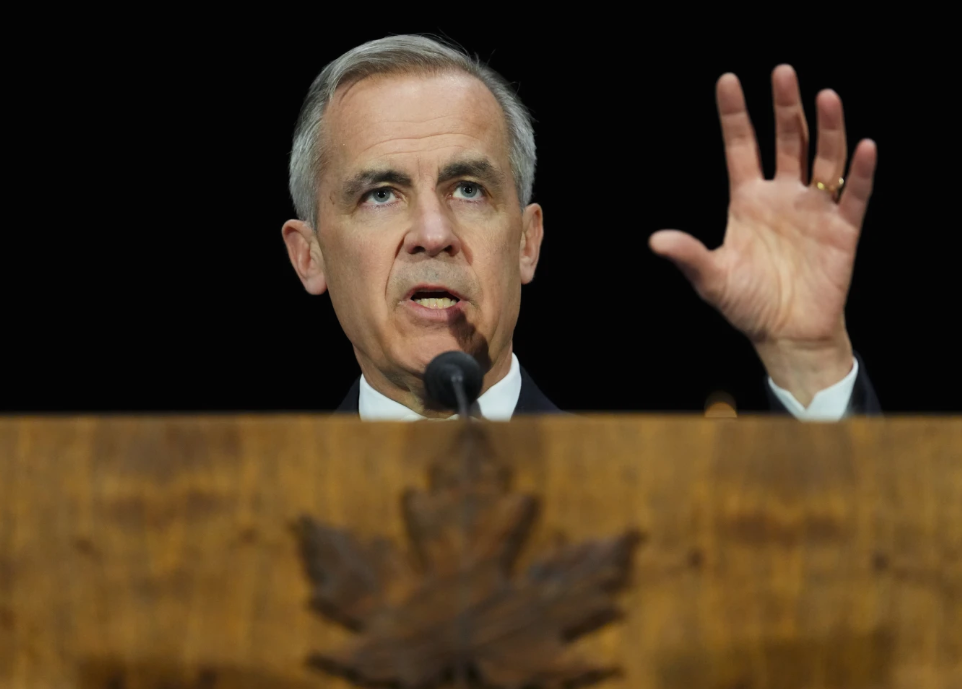New Canadian Prime Minister Mark Carney and his Conservative challenger both emphasized the need for U.S. President Donald Trump to respect Canada’s sovereignty as they launched their election campaigns on Sunday. Their campaigns are set against the backdrop of a trade war and Trump’s threats of annexation.
Carney revealed that the election campaign would span five weeks, culminating in a vote on April 28.
“President Trump says that Canada isn’t a real country and wants to break us so that America can take control,” Carney said. “We won’t let that happen.”
The governing Liberal Party, once facing a potential historic loss this year, found a surge in support after Trump initiated a trade war. Trump’s repeated remarks, including his suggestion that Canada should join the U.S. as its 51st state, have deeply angered Canadians and sparked a rise in nationalism. This growing sense of Canadian identity has given the Liberals a boost in recent polls.
Mark Carney, the newly elected Canadian Prime Minister, expressed that the country is facing its “most significant crisis of our lifetimes” due to President Trump’s unfair trade actions and his threats to Canadian sovereignty.
Carney’s comments come as Canada heads into an election campaign for the 343 seats in the House of Commons, which will last 37 days. While several parties are running, the Liberals and Conservatives remain the only two with a realistic chance to form a government. The party that secures a majority in Parliament, either on its own or with support from another party, will take control of the government, and its leader will become the next prime minister.
Mark Carney succeeded Justin Trudeau as Prime Minister after Trudeau announced his resignation in January. Trudeau remained in power until March 9, when the Liberal Party selected a new leader following a leadership contest.
The opposition Conservatives had hoped to center the election around Trudeau, whose popularity had declined due to rising food and housing costs and increasing immigration. However, after years of stable relations between Canada and the U.S., the election is now expected to focus on who is best suited to handle President Trump’s actions and threats.
Mark Carney emphasized that the choice for Canadians is between a “Canadian Trump” or a government that unites the nation. He pointed out that the division and negativity seen in the U.S. under Trump should serve as a warning for Canada.
Trump has imposed a 25% tariff on Canada’s steel and aluminum and is threatening additional tariffs on all Canadian goods, as well as on products from other trading partners, starting on April 2.
Carney’s main opponent, Pierre Poilievre, leader of the Conservative Party, had been poised for a significant victory in Canada’s federal election until Trump’s trade and annexation threats disrupted their momentum.
Poilievre pledged to stand up to Trump but Alberta Premier Danielle Smith, an ally of the Conservatives, stated in an interview that Poilievre would align closely with the “new direction in America.”
“I will insist that the president respects Canada’s independence and sovereignty. I will demand he stop imposing tariffs on our nation,” Poilievre declared as he kicked off his campaign.
He acknowledged the concerns and frustrations of Canadians, especially in response to Trump’s unacceptable threats against the country.
Mark Carney, who is running for Prime Minister of Canada, has not yet had a conversation with U.S. President Donald Trump, and it seems unlikely this will happen before the upcoming election. While Trump mocked former Prime Minister Justin Trudeau by calling him “governor,” he has not mentioned Carney by name.
Carney laid out certain conditions for any potential conversation with Trump, stating that before they can discuss a trade agreement, Trump must acknowledge Canada’s sovereignty. “Mr. Trump must recognize that Canada is a sovereign country. He has to say that and accept it before we can have a discussion about a trade agreement,” Carney said, adding, “Let’s just say there is no meeting that has been planned.”
Carney, 60, previously served as the head of the Bank of Canada during the 2008 financial crisis and later became the first non-British citizen to lead the Bank of England, where he managed the effects of Brexit.
Under Carney’s leadership, the Liberal Party has shifted rightward, rolling back Trudeau’s carbon tax and a proposed capital gains tax hike. He also announced a tax cut for the middle class on Sunday.
Carney’s main rival, Pierre Poilievre, 45, is a long-time career politician and populist who has positioned himself as a defender of “Canada first.” Poilievre has vowed to defund the public broadcaster and has banned media from accompanying his campaign on buses and planes.













